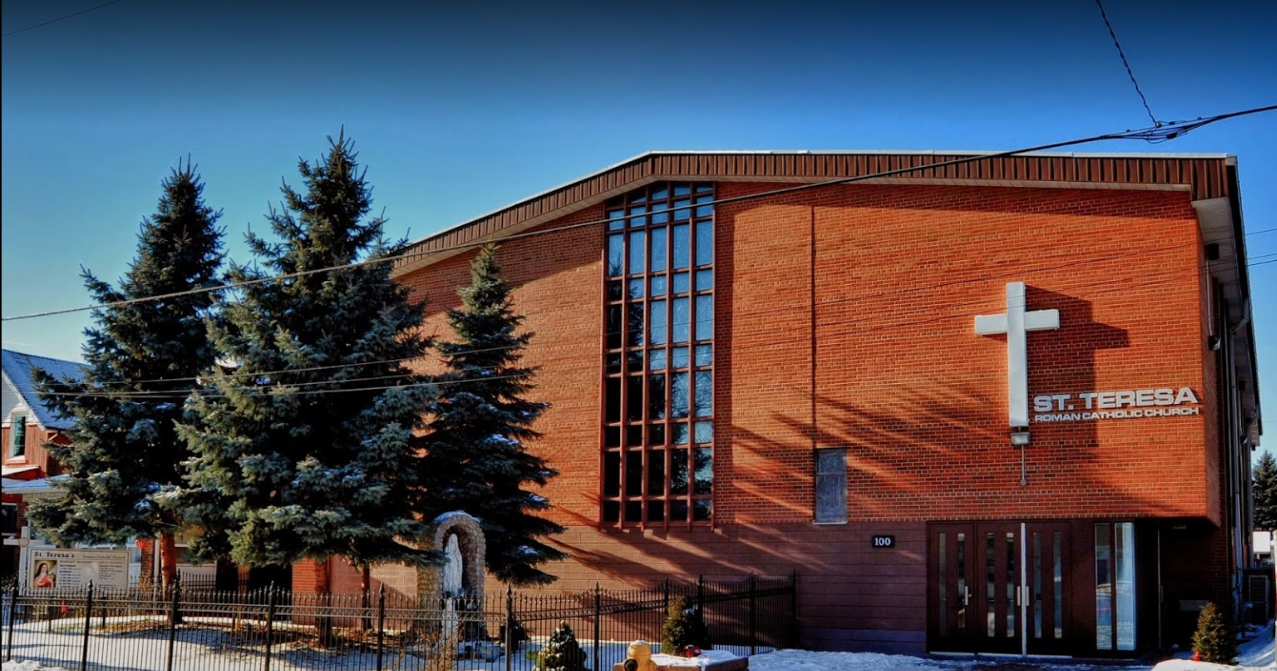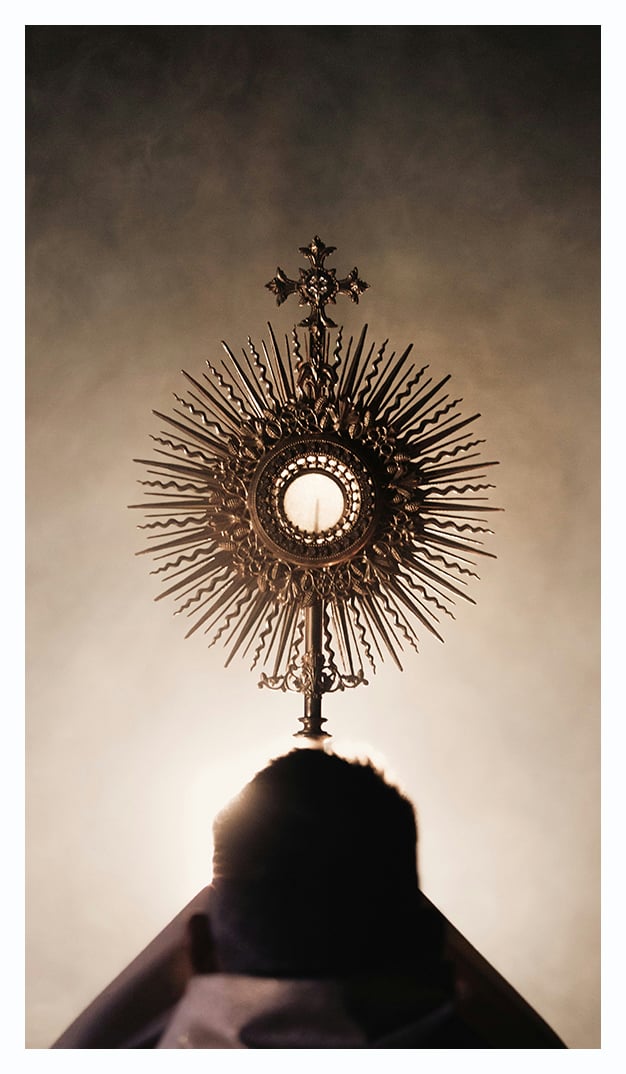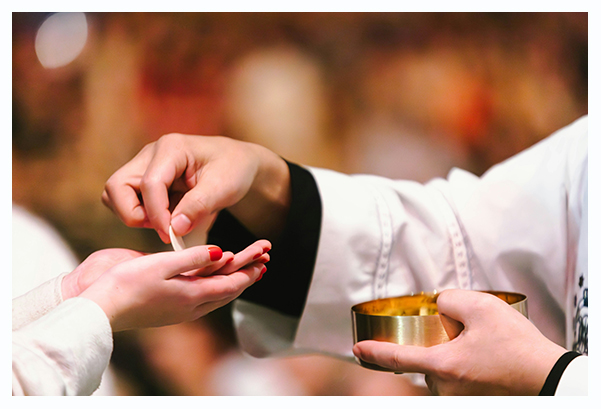
Come, Eat of my Food and Drink of the Wine
This reflection based on the readings for the Twentieth Sunday in Ordinary Time- Year B: Proverbs 9: 1-6; Psalm 34; Ephesians 5:15-20; and John 6: 51-58.
This Sunday’s first reading, from the Book of Proverbs, contains an invitation that anticipates the great gift which Jesus will make to the Church in the gift of His Body and Blood—“Come, eat my food and drink of the wine….” Since the recent Covid-19 health crisis, throughout the world, it seems that many people have lost sight of the importance of this great invitation. I regret to say, some of the changes in attitude towards the importance of the obligation to attend Sunday Mass may have been a result of people interpreting Church closures and restrictions in numbers, during these extraordinary conditions, to mean that attendance at Sunday Mass in normal circumstances was not important. However, as we hear Jesus say categorically in this Sunday’s Gospel, “Unless you eat the flesh of the Son of man and drink of His Blood, you do not have life within you,” it is important to emphasize just how crucially important our reception of the Eucharist at Sunday Mass really is to our faith life and our relationship to Christ and His Church.
There are occasions in the scriptures when Jesus tells parables about a banquet that was given and some of those invited did not attend (See Luke 14:15-24). In order that we might appreciate the nature of the banquet that Jesus invites us to each Sunday, in memory of Him, I would like to reflect a bit on what Jesus has done to prepare and invite us to the banquet He wishes to offer us each Sunday. 
Jesus begins today’s Gospel by saying: “I am the living bread that came down from Heaven” (John 6:51). In order for Him to give us His Body and Blood to eat and drink, Jesus had to become a human being. His supper was prepared by Him becoming a man and living among us. Because the gates of Heaven had been closed by the sins of a human being, they could only be open to human beings by Jesus becoming a human and opening them again by His death and resurrection. Through His sacrifice on the cross and His obedience to the Father, Jesus, in His humanity, was able to once again open the gates of Heaven to humanity and reconcile us to the Father. The opening prayer for the Solemnity of the Ascension mentions this as it refers to Christ the head of the Church ascending to where we - the Body and members of the Church - also hope to follow. This past week, as we celebrated the Assumption of Mary, we celebrated the fact that we, the members of the Church, are also invited to heaven Body and Soul, by following the faith example of the Blessed Mother. We also see the significance of Christ’s victory in the creed, as we confess that Jesus descended into hell, before His Ascension, to get those for whom the gates of Heaven had been closed. In fact, everything that Jesus did in His incarnation was in preparation for the saving banquet of the Eucharist and Heaven to which we are invited.
Now, I have mentioned that Jesus became human in order that He might open the gates of Heaven again to humanity. However, in today’s Gospel, Jesus is actually saying something more significant. As Jesus states, “Whoever eats my flesh and drinks my blood remains in me and I in him. Just as the living Father sent me and I have life because of the Father, so also the one who feeds on me will have life because of me.” (John 6: 56-57) Here Jesus is saying, “Unless you eat my resurrected flesh, you cannot be resurrected.” Saint Pope John Paul II wrote of the importance of receiving the Eucharist in order to participate in the resurrection in a letter entitled Ecclesia de Eucharistia (The Eucharist and the Church). Here he wrote:
“Those who feed on Christ in the Eucharist need not wait until the hereafter to receive eternal life: they already possess it on earth, as the first-fruits of a future fullness which will embrace man in his totality. For in the Eucharist we also receive the pledge of our bodily resurrection at the end of the world: ‘He who eats my flesh and drinks my blood has eternal life, and I will raise him up at the last day’ (John 6:54). This pledge of the future resurrection comes from the fact that the flesh of the Son of Man, given as food, is his body in its glorious state after the resurrection. With the Eucharist we digest, as it were, the ‘secret’ of the resurrection. For this reason Saint Ignatius of Antioch rightly defined the Eucharistic Bread as ‘a medicine of immortality, an antidote to death’” (Pope John Paul II, Ecclesia de Eucharistia, para. 18).
Each time we attend Mass, Christ is inviting us to receive the gift of all that He has done for us. The Eucharist is His pledge of life eternal. Salvation through communion with Him and the Holy Trinity and life eternal are all contained in the gift of His Body and Blood. The Eucharist is an invitation from God Himself to life eternal.
 In light of what Christ is saying in today’s Gospel, it seems crucial to once again emphasize the importance of actually being physically present at Mass to receive the Eucharist, whenever that is physically possible. Jesus did not make any preparations for us to receive the Eucharist virtually. He really became a human being in the flesh and actually became one of us to be truly present to us. He really died on the cross and gave His flesh that we might have eternal life. In this Sunday’s Gospel, Jesus is insisting that we really receive what He really gave for our salvation. He did not, and could not, stay in Heaven in order to save us. Our salvation could not have been won for us virtually or by livestream. In the same way, we are invited to really and truly be present at the banquet that he has prepared for us and to which we are invited every Sunday—provided that is physically possible for us.
In light of what Christ is saying in today’s Gospel, it seems crucial to once again emphasize the importance of actually being physically present at Mass to receive the Eucharist, whenever that is physically possible. Jesus did not make any preparations for us to receive the Eucharist virtually. He really became a human being in the flesh and actually became one of us to be truly present to us. He really died on the cross and gave His flesh that we might have eternal life. In this Sunday’s Gospel, Jesus is insisting that we really receive what He really gave for our salvation. He did not, and could not, stay in Heaven in order to save us. Our salvation could not have been won for us virtually or by livestream. In the same way, we are invited to really and truly be present at the banquet that he has prepared for us and to which we are invited every Sunday—provided that is physically possible for us.
There is an expression: “Preaching to the choir.” It refers to giving a homily to people about something they are already doing. Today, for those of you here at Mass, it may seem that I am preaching to the choir by speaking to you about something that you are already here doing. The reason that I am doing it, is to ask you to take this message to those who are not here—your family, friends and other Catholics whom you may know, who think that it is okay to no longer attend Mass because things have changed. There is an urgency to this message and to what Jesus is saying in today’s Gospel. The bread of Life Discourse is one of the essential teachings of Jesus and in it He makes clear that it is vital that we understand His words and their significance. Let us work in the coming weeks to bring this wonderful invitation to our brothers and sisters. In this invitation, Jesus states emphatically in His own very powerful words: “Amen, amen, I say to you, unless you eat the flesh of the Son of Man, and drink His blood, you do not have life within you. Whoever eats my flesh and drinks my blood has eternal life, and I will raise him on the last day. For my flesh is true food, and my blood is true drink. Whoever eats my flesh and drinks my blood remains in me and I in him. Just as the living Father sent me and I have life because of the Father, so also the one who feeds on me will have life because of me. This is the bread that came down from Heaven. Unlike your ancestors who ate and died, whoever eats this bread will live forever” (John 6: 53-58).
Let us always respond to this invitation with great joy!
Fr. Michael McGourty is Pastor of St. Peter’s Church in downtown Toronto.
